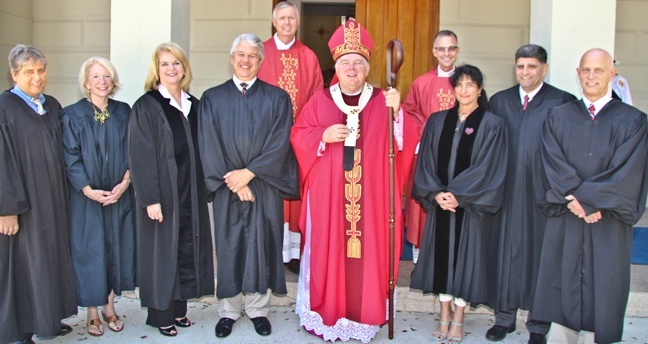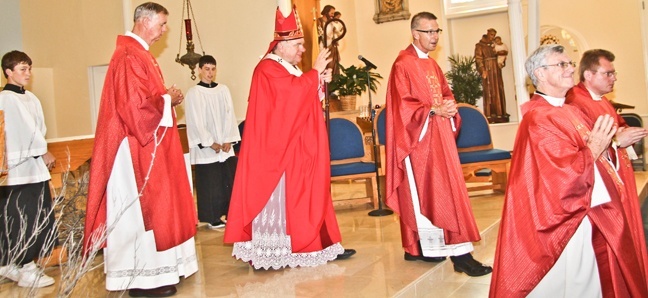By Archbishop Thomas Wenski - The Archdiocese of Miami

Photographer: COURTESY PHOTO | Tom Oosterhoudt / Conch Color
Archbishop Thomas Wenski poses with Key West and Monroe County judges after the annual Red Mass for the legal profession, celebrated at the minor basilica of St. Mary Star of the Sea in Key West. Behind them are Deacon Peter Batty and Father John Baker, pastor, of St. Mary Star of the Sea.
For Jesus, one�s relationship with God cannot be defined merely in terms of a legal contract: You do your part and God will do his. Such an attitude that focuses on merely legal and external obedience to God usually ends up having us espousing an ethical minimalism in our dealings with God and with our neighbor. In other words, how much can we get away with? For example, as Catholics during Lent we fast � and on Fridays we abstain from meat. The legalistic approach of the scribes would seek to determine just how much of a hot dog we could eat before we violate our Friday abstinence � since they would argue that after all, there�s little real meat in hot dogs these days.
For Jesus, righteousness is a right relationship � a relationship that springs out of a right heart, mind and soul. And it is in Jesus� person that we see what righteousness is. He fulfills all righteousness. Righteousness, for Jesus, is one�s being right with God � and Jesus would also insist, to be right with God, you also have to be right with your neighbor. In this same Gospel, Jesus tells us that worship � which should be an expression of our being right with God � rings hallow if we are not right with our brethren. And he urges us to seek right relationships with others � in a way that legal means can never accomplish. �Leave your gift at the altar.� �Settle before you go to court.� As you know only too well from experience, legal recourse often just equalizes the pain � leaving the parties unchanged, with the relationship worse than before.
The law cannot make us righteous before the Lord, for as St. Paul preached, we are saved by grace and not by the law. But there can be righteous laws � in as much as they support our efforts of mind, heart and soul � to live in right relationships, with God and with our neighbors. Such laws promote human flourishing. But there are also unrighteous laws � that are unrighteous, and therefore, unjust, because they undermine these right relationships. The legal structure of Jim Crow is one example; and laws or an administrative mandate that have the force of law that would force citizens to violate their consciences is another example.
As we know, on January 20, the Department of Health and Human Services announced a decision to issue final regulations that would force practically all employers, including many religious institutions, to pay for abortion-inducing drugs, sterilizations, and contraception. The regulations would provide no protections for our great institutions - such as Catholic charities, hospitals, and universities - or for the individual faithful in the marketplace. The regulations struck at the heart of our fundamental right to religious liberty, which affects our ability to serve those outside our faith community.
Since January 20, the reaction was immediate and sustained. We came together, joined by people of every creed and political persuasion, to make one thing resoundingly clear: We stand united against any attempt to deny or weaken the right to religious liberty upon which our country was founded.
On Friday, Feb. 10, the Administration issued the final rules. By their very terms, the rules were reaffirmed �without change.� The mandate to provide the illicit services remains. The exceedingly narrow exemption for churches remains. Despite the outcry, all the threats to religious liberty posed by the initial rules remain. The so-called compromise was just an accounting trick, a sham. A �hot dog� is still a hot dog even if we give it another name.
Religious freedom is a fundamental right of all. This right does not depend on any government�s decision to grant it: It is God-given, and just societies recognize and respect its free exercise. The free exercise of religion extends well beyond the freedom of worship. It also forbids government from forcing people or groups to violate their most deeply held religious convictions, and from interfering in the internal affairs of religious organizations.
Recent actions by the Administration have attempted to reduce this free exercise to a �privilege� arbitrarily granted by the government as a mere exemption from an all-encompassing, extreme form of secularism. The exemption is too narrowly defined, because it does not exempt most non-profit religious employers, the religiously-affiliated insurer, the self-insured employer, the for-profit religious employer, or other private businesses owned and operated by people who rightly object to paying for abortion-inducing drugs, sterilization, and contraception. And because it is instituted only by executive whim, even this unduly narrow exemption can be taken away easily.
In the United States, religious liberty does not depend on the benevolence of who is regulating us. It is our �first freedom� and respect for it must be broad and inclusive - not narrow and exclusive. Catholics and other people of faith and good will are not second-class citizens. And it is not for the government to decide which of our ministries is �religious enough� to warrant religious freedom protection.
This is not just about contraception, abortion-causing drugs, and sterilization - although all should recognize the injustices involved in making them part of a universal mandated health care program. It is not about Republicans or Democrats, conservatives or liberals. It is about people of faith. This is first and foremost a matter of religious liberty for all. If the government can, for example, tell Catholics that they cannot be in the insurance business today without violating their religious convictions, where does it end? This violates the constitutional limits on our government, and the basic rights upon which our country was founded.
Much remains to be done. We cannot rest when faced with so grave a threat to the religious liberty for which our parents and grandparents fought. In this moment in history we must work diligently to preserve religious liberty and to remove all threats to the practice of our faith in the public square. This is our heritage as Americans. For this reason, we must continue to oppose the Health Care Mandate; and, here in Florida, we have the opportunity to make right a wrong by supporting Amendment 8 in November. This amendment would protect religious freedom in our state by removing from our state constitution a vestige of 19th century anti-Catholicism, the �Blaine� language which forbids state support to �sectarian� institutions.
The unprecedented challenges to our freedom to serve demand of us � both as citizens and as men and women of faith � the tremendous resolve and courage of a St. Thomas More. We are at truly at a crossroads in our national life.

Photographer: COURTESY PHOTO | Tom Oosterhoudt / Conch Color
Archbishop Thomas Wenski processes out of the minor basilica of St. Mary Star of the Sea after celebrating the annual Red Mass for those in the legal profession in Monroe County. Accompanying him, from left, are: Deacon Peter Batty and Father John Baker, pastor, of St. Mary Star of the Sea in Key West; Father Gerald Morris, pastor of San Pablo in Marathon; and Father Henryk J. Pawelec, administrator of San Pedro in Tavernier.

